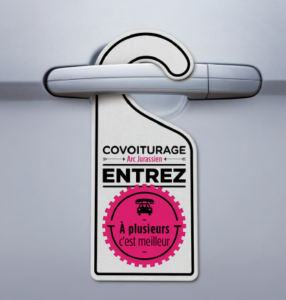The carpooling project in the Jura Arc promotes car sharing in this mid mountain region underserved by public transports. The initiative aims at facilitating local workers’ moves while at the same time encouraging social connections between people and decreasing greenhouse gas emissions.
Initiated in 2011, the carpooling project of the Jura Arc is supported by 16 institutional partners on both sides of the border. Private entities are also involved in the project with many companies encouraging carpooling among their employees. From 2015 to 2018, the project benefited also from a financial support of the European Fund for Regional Development and from the Swiss Confederation through the INTERREG V A France-Switzerland cooperation programme.
1. How does carpooling work in the Jura Arc?
A centralised mechanism to encourage collective trips to work
 The carpooling project is developed along the 230km border of the French-Swiss Jura Arc border. To connect car poolers, a telephone centre has been developed, available on working days from France and Switzerland. People willing to find a driver or to share their car can call this telephone centre, which is then proposing solutions and connecting car poolers.
The carpooling project is developed along the 230km border of the French-Swiss Jura Arc border. To connect car poolers, a telephone centre has been developed, available on working days from France and Switzerland. People willing to find a driver or to share their car can call this telephone centre, which is then proposing solutions and connecting car poolers.
Moreover, official carpooling parking spaces have been created to help car poolers find each other more easily. Thanks to the support of local municipalities, there are already more than 100 carpooling parking spaces in the Jura Arc.
Local companies can also subscribe to the project to encourage their employees in sharing their car journeys. To better inform workers, the project developed a communication kit that companies can use. It not only advertises the project but also provides useful guidelines to car poolers as well as legal information regarding car insurance for instance. Information days can also be organised for employees in their company to promote carpooling and answer their questions.
Each year in November, when traffic conditions are getting harder with the approaching winter, these companies also participate in the challenge organised by the carpooling project. This competition aims at encouraging people to try carpooling or to make it more popular. It rewards several car poolers teams as well as the best company in terms of carpooling promotion.
An inclusive governance
The project is supported by 16 local administrations, in majority cantons, agglomerations and municipalities, each one serving as a local contact point for potential car poolers. More than 130 companies also take part in the project and are actively involved in its development.
Each year, companies’ mobility officers are invited to participate to mobility task forces to discuss potential issues, possible solutions and further developments to encourage carpooling in the region.
2. Results and benefits of the carpooling project in the Jura Arc
With 130 companies being involved, the project targets more than 35.000 potential car poolers. Among them, 25% are using carpooling on a regular basis, more than 8.700 individuals. According to the project managers, carpooling doubled in the region in 5 years.
By involving companies in the project, the initiative benefits the economic attractiveness of the region. Such a project, in a public transport underserved territory, optimizes conditions for the implementation of new companies and stimulates jobs creation in the Jura Arc.
It is also an opportunity for existing companies and workers to get involved in sustainable mobility. Environmental benefits of such a practice are indeed interesting, since 1.1 tonne of CO2 can be saved each year by one regular car pooler. This also has implications in term of landscape, as less space needs to be dedicated to car parks.

Annual savings for a regular car pooler
Car poolers can also enjoy the economic benefits of carpooling by saving around 2.300 euros per year in oil and car maintenance. This is also a good way for users to at the same time enjoy a safe and traffic jam free trip and create more social connexions with other car poolers.
The interests of carpooling are clear in such a region, where workers often cross the border and where traffic is reaching a high level of congestion. Euromontana spotted carpooling and car-sharing formulas as possible solutions for a greener rural mobility within the Move On Green project in 2014. While using a digital tool to connect people appeared as one of the difficulties, the carpooling project of the Jura Arc seems to have overcome this issue with the development of its telephone centre.
More information
For more information on the carpooling project of the Jura Arc, please visit its website. If you are looking for more inspiration on collective and sustainable mobility in mountain and / or rural areas, please consult the “policy guidelines for sustainable mobility in rural and mountain areas” and the good practices data base from the Move On Green project.
Download the good practice in a PDF file!
25 April 2019










